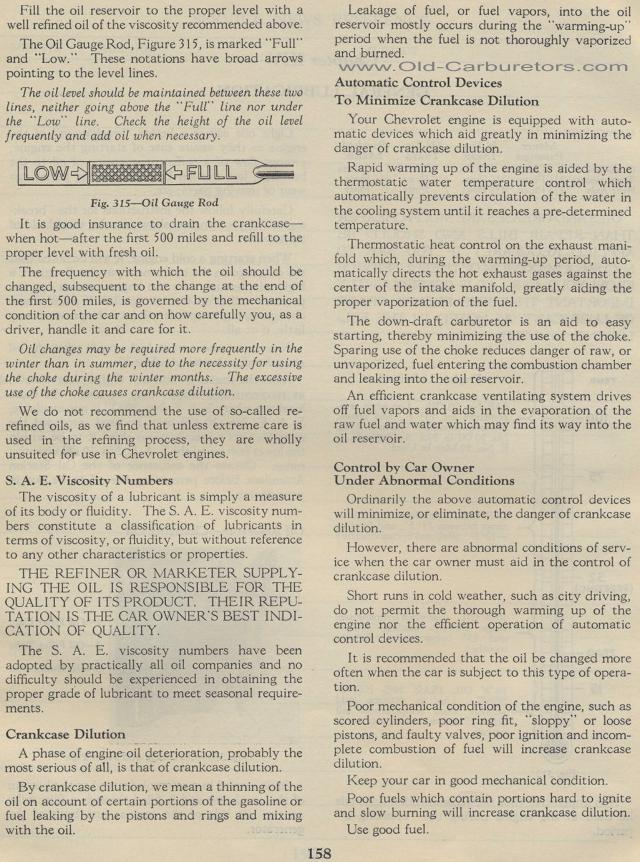Fill the oil reservoir to the proper level with a well refined
oil of the viscosity recommended above.
The Oil Gauge Rod, Figure 315, is marked "Full" and "Low." These
notations have broad arrows pointing to the level lines.
The oil level should be maintained between these two lines, neither going above
the "Full" line nor under the "Low" line. Check the height
of the oil level frequently and add oil when necessary.
Oil Gauge Rod
It is good insurance to drain the crankcase —when hot — after
the first 500 miles and refill to the proper level with fresh oil.
The frequency with which the oil should be changed, subsequent
to the change at the end of the first 500 miles, is governed
by the mechanical condition of the car and on how carefully
you, as a driver, handle it and care for it.
Oil changes may be required more frequently in the winter than
in summer, due to the necessity for using the choke during the
winter months. The excessive use of the choke causes crankcase
dilution.
We do not recommend the use of so-called re-refined oils, as
we find that unless extreme care is used in the refining process,
they are wholly unsuited for use in Chevrolet engines.
S. A. E. Viscosity Numbers
The viscosity of a lubricant is simply a measure of its body or
fluidity. The S. A. E. viscosity numbers constitute a classification
of lubricants in terms of viscosity, or fluidity, but without
reference to any other characteristics or properties.
THE REFINER OR MARKETER SUPPLYING THE OIL IS RESPONSIBLE FOR THE
QUALITY OF ITS PRODUCT. THEIR REPUTATION IS THE CAR OWNER'S BEST
INDICATION OF QUALITY.
The S. A. E. viscosity numbers have been adopted by practically
all oil companies and no difficulty should be experienced in obtaining
the proper grade of lubricant to meet seasonal requirements.
Crankcase Dilution
A phase of engine oil deterioration, probably the most serious
of all, is that of crankcase dilution.
By crankcase dilution, we mean a thinning of the oil on account
of certain portions of the gasoline or fuel leaking by the pistons
and rings and mixing with the oil.
158
Leakage of fuel, or fuel vapors, into the oil reservoir mostly
occurs during the "warming-up" period when the fuel is
not thoroughly vaporized and burned.
Automatic Control Devices
To Minimize Crankcase Dilution
Your Chevrolet engine is equipped with automatic devices which
aid greatly in minimizing the danger of crankcase dilution.
Rapid warming up of the engine is aided by the thermostatic water
temperature control which automatically prevents circulation of
the water in the cooling system until it reaches a pre-determined
temperature.
Thermostatic heat control on the exhaust manifold which, during
the warming-up period, automatically directs the hot exhaust gases
against the center of the intake manifold, greatly aiding the proper
vaporization of the fuel.
The down-draft carburetor is an aid to easy starting, thereby minimizing
the use of the choke. Sparing use of the choke reduces danger of
raw, or unvaporized, fuel entering the combustion chamber and leaking
into the oil reservoir.
An efficient crankcase ventilating system drives off fuel vapors
and aids in the evaporation of the raw fuel and water which may
find its way into the oil reservoir.
Control by Car Owner Under Abnormal Conditions
Ordinarily the above automatic control devices will minimize, or
eliminate, the danger of crankcase dilution.
However, there are abnormal conditions of service when the car
owner must aid in the control of crankcase dilution.
Short runs in cold weather, such as city driving, do not permit
the thorough warming up of the engine nor the efficient operation
of automatic control devices.
It is recommended that the oil be changed more often when the car
is subject to this type of operation.
Poor mechanical condition of the engine, such as scored cylinders,
poor ring fit, "sloppy" or loose pistons, and faulty
valves, poor ignition and incomplete combustion of fuel will increase
crankcase dilution.
Keep your car in good mechanical condition.
Poor fuels which contain portions hard to ignite and slow burning
will increase crankcase dilution. Use good fuel.

|
